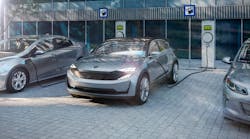Some experts argue that the long-anticipated explosion in the demand for electric vehicles (EVs) may be delayed by the economic impacts of COVID-19. Others maintain the boom is coming and the electric infrastructure needed to charge all those vehicles may not be ready to meet the demand. We have heard different versions of EV growth and infrastructure shortfall prognostications for years. What's new is the strategy of using managed charging to address predicted electric infrastructure inadequacies. Stated simply, managed charging is coordinated EV charging with vehicle-grid integration (VGI). Is it possible that this strategy also can provide a much-needed value proposition to increase EV demand?
EV demand is a tough nut to crack. Some argue the reason for the lack in demand is continuing paltry promotion by the automobile industry. Sadly, the power industry’s indulgence of automakers and other EV stakeholders, using its own increasingly rarified capital, has largely failed to instill the needed public demand. Admittedly, there are a few more EVs on the road today compared to say, 25 years ago. However, the U.S. EV market share still hovers around 2%, and investment in traditional charging infrastructure may do little to change that.
The auto industry apparently has lost sight of its roots. Winning the masses over to horseless buggies was a major endeavor. What did the industry do? They fostered racetracks in many cities and financed cross country road rallies to increase exposure to autos. As time went on, movie stars and high-profile celebrities created interest and sizzle surrounding fast cars. Obviously, it continues today with the likes of the “Dukes of Hazzard” and the “Fast and Furious” series. Admittedly, there have been some EV promotional events, but still, the sizzle is not there. Possibly, we need more really hot EVs, like the recently announced electric-Mustang-cobra-jet.
Let’s face it, glamour and sizzle frequently atone for an imperfect value proposition in our commercial world. Absent magnetic appeal, mass adoption of EVs requires a compelling value proposition. Sadly, it still takes a CPA to explain how one might be better off in 10 years by purchasing an EV instead of an internal combustion (IC) auto. There may be another way, both for auto owners and utilities, to realize the enhanced value currently needed to make the EV choice attractive. It’s referred to as managed charging. This strategy is not as foolproof in terms of increasing EV adoption as simply having EVs with their own mass appeal, but if the proliferation of distributed energy resources (DERs) is any indication, managed charging could be the needed accelerant for the EV market.
Managed charging involves customer or central control of EV charging to facilitate vehicle-grid integration (VGI). This movement recognizes EVs as a significant and potentially leading ingredient in the DER value chain, including participation in wholesale market services. The value proposition is two-fold: EV owners realize greater economies by market participation, and utilities optimize existing infrastructure by managing charging and demand response. If our experience with other organized ancillary service offerings is any indication, participation in the wholesale market space will create more value for EV owners than a special charging rate or other typical EV promotions. Further, while EV experts are still somewhat optimistically forecasting that EV charging demand may outstrip available capacity by 2030, its worth remembering that building new distribution capacity, particularly in urban and suburban areas can easily take a decade or longer to permit and construct. Managed charging should help ensure mass deployment of EVs is not delayed beyond 2030 by limited charging and distribution capacity.
EVs are part of the larger discussion surrounding grid evolution and the future of the electric utility industry. However, turning managed charging concepts into mainstream practice will, even according to staunch proponents, require additional learning and adaptation on multiple fronts. Areas of ongoing study include: quantifying the value of managed charging and its scalability; determining the most appropriate technology and standards; assessing the value and issues related to vehicle-grid integration and vehicle load control; and evaluation of tradeoffs related to active vs. managed charging. Finally, similar to the standardization of substation communications and system protocols fostered by IEC 61850, stakeholders will likely need to establish a common managed charging open protocol or set of protocols to streamline implementation, reduce costs and avoid stranded assets related to managed charging aggregation programs.
The EV community believes that the market share of EVs is beginning a rapid ascent and utilities may be unable to meet vehicle charging demand. While still a work in progress and possibly not an “easy” cure, managed charging may improve the value proposition for EV ownership and finally bring the EV growth many have been predicting. In addition, managed charging should help prevent utility distribution infrastructure from being a bottleneck for EV growth.


